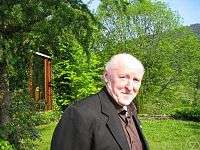Albert Shiryaev
Albert Nikolayevich Shiryaev (Russian: Альбе́рт Никола́евич Ширя́ев; born October 12, 1934) is a Soviet and Russian mathematician. He is known for his work in probability theory, statistics and financial mathematics.
Albert Shiryaev | |
|---|---|
 Albert Nikolaevich Shiryaev | |
| Born | October 12, 1934 |
| Nationality | Russian |
| Alma mater | Moscow State University |
| Known for | Probability theory |
| Awards | Markov Prize (1974) |
| Scientific career | |
| Fields | Mathematician |
| Institutions | Moscow State University Steklov Institute of Mathematics University of Manchester |
| Doctoral advisor | Andrey Kolmogorov |
| Doctoral students | Dmitry Kramkov Ernesto Mordecki Alexander Novikov |
Career
He graduated from Moscow State University in 1957. From that time until now he has been working in Steklov Mathematical Institute. He earned his candidate degree in 1961 (Andrey Kolmogorov was his advisor) and a doctoral degree in 1967 for his work "On statistical sequential analysis". He is a professor of the department of mechanics and mathematics of Moscow State University, since 1971. He was elected a corresponding member of the Russian Academy of Sciences in 1997 and a full member in 2011. As of 2007 Shiryaev holds a 20% permanent professorial position at the School of Mathematics, University of Manchester.
Contributions
His scientific work concerns different aspects of probability theory, statistics and its applications. He has contributions to:
- Nonlinear theory of stationary stochastic processes
- Problems of fast detection of random effects (A.N. Kolmogorov Prize of Russian Academy of Sciences, 1994)
- Problems of optimal nonlinear filtration, stochastic differential equations (A.N. Markov Prize of USSR Academy of Sciences, 1974)
- Problems of stochastic optimization, including "Optimal stopping rules"
- Problems of general stochastic theory and martingale theory
- Problems of stochastic finance (monograph "The Essentials of Stochastic Finance", English and Russian editions)
Publications
- Change of Time and Change of Measure (2nd Edition) - World Scientific Publishing[1]
- Optimal Stopping Rules(1978) - Springer-Verlag
External links
- Albert Shiryaev at the Mathematics Genealogy Project
- A.N. Shiryaev at MSU (in Russian)
- A.N. Shiryaev at RAS.
- A.N. Shiryaev at Math-Net.Ru.